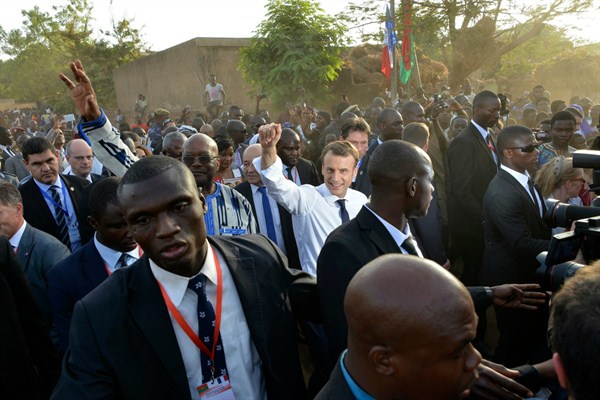After a first six months spent focused on matters domestic and European, French President Emmanuel Macron has begun to travel farther afield. He is in West Africa this week, having arrived yesterday in Burkina Faso and continuing on to Cote d’Ivoire and Ghana. Earlier this month he traveled to the Persian Gulf for a planned visit to the United Arab Emirates, making an unplanned stopover in Saudi Arabia on his way back to Paris.
In West Africa, Macron will try, as all new French presidents must, to reset a relationship burdened by the historical legacy of colonial exploitation and postcolonial meddling known as Francafrique. The gesture is a timeworn and almost rote exercise, but its significance can become most evident when poorly executed. In 2007, then-President Nicolas Sarkozy notoriously bungled his inaugural visit to sub-Saharan Africa, and set back an ambitious agenda for modernizing France’s security ties with its former colonies, with a poorly received speech deemed condescending and patronizing by his Senegalese hosts and the region at large. Macron’s message of equal partnership to university students in Ouagadougou yesterday was an improvement, but he was nonetheless treated to a rowdy reception.
Security will be at the top of the agenda for Macron, who already made a flash visit to Bamako, Mali’s capital, immediately after his election to address some of the 4,000 French troops still deployed to the region as part of the Barkhane counterterrorism operation. The strain of that operation—combined with the 10,000-strong Sentinelle domestic counterterrorism deployment and France’s participation in the anti-ISIS coalition in Syria and Iraq—has left the French military overstretched and underfunded. Resentment among the top brass provoked a public spat in July between Macron and the then-chief of the armed forces, who was subsequently replaced. Macron yesterday expressed his impatience with delays in deploying the G5 Sahel regional counterterrorism force, which Paris sponsored in the hopes of downsizing its military footprint there. Deteriorating conditions in the north of Mali and emerging threats elsewhere make it unlikely France will be able to disengage anytime soon, however.

